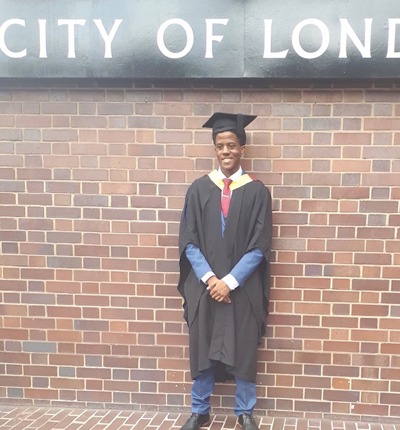
Inquest finds failure to appreciate sickle cell crisis symptoms in the death of 21-year-old Evan Nathan Smith
An inquest into the death of Evan Nathan Smith, 21, from Walthamstow, has concluded that his death was the consequence of a sickle cell crisis in a patient with biliary infection.
Posted on 06 April 2021
Evan died on 25 April 2019 at North Middlesex Hospital in Edmonton. At one point while being treated at the hospital Evan was so desperate for help that he rang 999 from his mobile phone to ask for oxygen because he was refused this by a nurse on his ward, the inquest heard. He was having difficulty breathing and he later told his family he felt calling 999 was the only way he could get help.
The coroner said there was a failure to appreciate the significance of Evan’s sickle cell crisis symptoms by those looking after him. He said there was a mindset in those looking after Mr Smith which distracted the treatment away from the need for an urgent exchange transfer to treat the sickle cell symptoms in favour of seeking to perform a procedure to look again at clearing the biliary tree from a stone or other obstruction.
He was not recognised to be developing sickle cell symptoms until 3.20am, 23 April, five days after his admission with the diagnosis of a bile duct infection, when he was attended by a doctor from the haematology department.
The inquest at Barnet Coroner's Court found that the delay in providing Evan with a blood transfusion was the cause of his death. The inquest also heard that the hospital’s haematology team were not made aware that he had been admitted until five days after he arrived at the hospital.
Following the inquest Evan’s parents Charles and Betty Smith said:
“Evan was an intelligent and caring young man with a very bright future ahead of him. He was an exceptionally conscientious and hardworking individual who treasured his family and friends and was always keen to help anyone who needed it. We continue to be devastated by his death and the shocking way his life was cut short so quickly.
Suzanne White, solicitor at law firm Leigh Day who represented the Smith family, added:
“Betty and Charles Smith had to fight for the inquest into their only son’s death to be held. The evidence presented to the coroner about the failures in Evan’s care has been very difficult for Betty and Charles to hear. We have heard that if the haematology team had been alerted sooner, then Evan may not have died two years ago.
“Evan was a young man with the potential for a hugely fulfilling life . . . he was intelligent and gifted, caring and the very centre of his parents’ lives. Betty and Charles will now take some time to consider their options.”
Evan was admitted to hospital 18 April 2019, 24 hours after a routine Endoscopic retrograde cholangiopancreatography procedure (ERCP) to remove a stent from his gallbladder. He was feverish, had concentrated urine and his eyes were becoming jaundiced.
Following tests in A&E Evan was moved to the Acute Medical Ward for observations. On 21 April he was told his observations were stable and he could not stay on the Acute Medical Ward and would be moved to the Tower Black ward (T6) to be observed by specialists. However, when he arrived on the ward there was no bed for him and he was placed on a temporary bed in the corridor next to a draughty window with no access to a nurse call button.
On 23 April his father Charles went to visit him and Evan told him how he had felt breathless in the night with pain in his joints. He requested oxygen from a nurse but was refused and told his father he felt the only option he had was to call 999 to request oxygen but was told this would not be possible as he was already in hospital. The inquest heard that a doctor had “impressed” upon nurses that he should be given oxygen.
When Charles visited again on 24 April he was alarmed to find five doctors crowded around Evan’s bed and was told Evan’s condition was deteriorating. At 7pm that evening he was moved to the High Dependency Unit. He was later transferred to the Intensive Care Unit (ICU). Charles had been told to go home but decided to wait in his car in the car park and later than night was told to come to the ICU immediately because Evan was critically unwell and had organ failure. Charles was extremely shocked as he had been reassured all along that his son would be fine. Evan never regained consciousness and died at 5.55am on 25 April 2019. His cause of death was listed by a pathologist as multiple organ dysfunction and cerebral infarction.
Evan’s parents met with North Middlesex University Hospital NHS on 8 August 2019 to discuss their son’s case and were told that many opportunities were missed. They were told that some of these were missed because Evan was admitted over the Easter weekend which meant that the hospital was low on resources. When Betty and Charles received Evan’s hospital notes later that month they also discovered that if doctors had worked according to deadlines to manage his care as far back as September 2018 his death could have been avoided.
Coroner Andrew Walker said on the first day of the inquest on 1 April that: “It seems to me that if a patient is identified as having a sickle cell disease, it should be flagged up to the haematology team…A member of that team should be available should a patient show signs of sickle cell crisis.”
The inquest into Evan’s death was only held after Betty and Charles brought their case to Leigh Day, who represented the family. Suzanne White made the case to the coroner, who agreed to hold an inquest.
Suzanne said: “People do not get answers into how their loved ones died without an inquest where one is necessary.”




